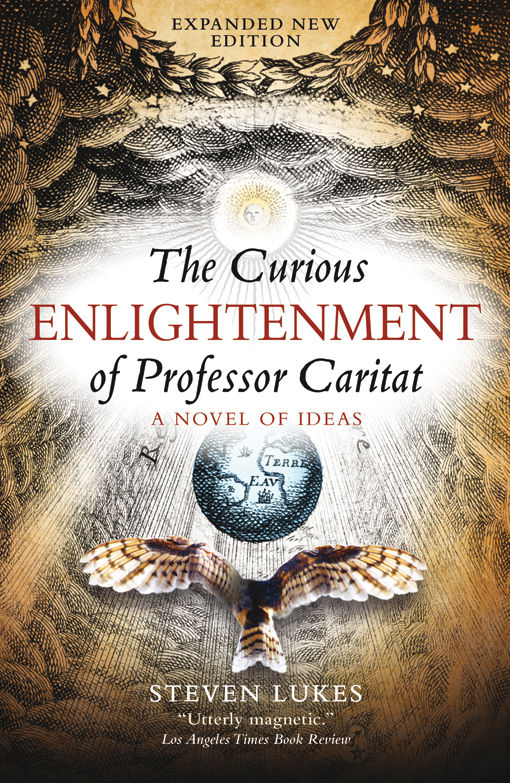Sometimes, being impulsive pays handsomely. This particular lesson began while visiting a small independent book publisher during one of their seasonal discounted book sales. Their entire outfit is quite small—the size of a banker’s living room in Nebraska, perhaps—and in order for the staff to not be inconvenienced by overflowing stacks of books, they routinely invite the public to buy whatever extra copies they have at heavily slashed prices. Dollar bins, free periodicals, that sort of thing. Book sales of this sort drive me mad. I look for dimes in my sock, quarters behind my ear, in my ear, etc. I take what I can, often choosing based on a word or an idea expressed on the back cover. I often make no choice at all—just pure impulse, a mechanical grab and drop. And that’s how I found The Curious Enlightenment of Professor Caritat, by Stephen Lukes.
The novel can be understood, quite simply, as a philosophical novel. That is, a novel of ideas. But there is no chief definition of the philosophical novel, at least none that are agreeable among scholars, and tracing the history of the novel, it is not easily collapsible into neat categories. We can see Plato’s dialogues as examples of the philosophical novel, as are, more recently, the works of David Foster Wallace or Robert Musil. There is also disagreement among novelists and philosophers as to whether the disciplines are complimentary or at odds; can a novelist also be a philosopher? Can a philosopher possibly be a good storyteller?
Steven Lukes, a professor of philosophy at New York University, approached the matter of teaching philosophy through fiction another way, opting to neither confuse nor assume similarities between the two. Instead, he chose to use meta-narrative—that is, to devise a comprehensive way of explaining philosophical concepts through a sequence of narrative events—which becomes a clear and level-headed introduction to political economy under the guise of an adventure novel. The protagonist, a bookish philosopher named Professor Caritat, is a fictionalized version of the great Enlightenment philosopher Nicolas de Condorcet. Major political ideas, from utilitarianism to egalitarianism to utopianism, become eponymous “worlds” whose social and cultural structures are governed by the ideologies inherent to the respective ideas themselves. Professor Caritat’s task is to venture out and visit these various worlds and report on which among them represents the ideal society. He is forced to do so under duress; he is kidnapped by his own government, re-kidnapped by the underground resistance, and then asked—though with threat of retribution if he refuses—to use his critical faculties to survey the world of political thought, determine which is best suited to life, and report his findings. All else—finding accommodation, having money for travel, protection from state and local authorities—is left to him, without any noticeable aid or support. There is much humor in an aloof professor forced to venture beyond his academic post and cavort like a modern-day Indiana Jones.
Remember, I knew none of these when I purchased it on a whim. And I read it not because it seemed good, but because it was nearby and I needed something to read on the train. Now, being slightly disheveled and out-of-sorts most of the time, I also overlooked a significant coincidence: I was working on Stephen Lukes’s translations of Émile Durkheim’s sociology texts at work. I didn’t put the two together until after I had finished the novel, and the translations were on sale—which, having come to this realization so late, made me feel foolish. No matter, Lukes’s book still remains one of my favorite reads of the summer.
The book is an homage to great philosophical and literary works, from Voltaire’s Candide to the more contemporary Sophie’s World. It is fun and informative, but for me, what drew me in was the thing that I had been craving and missing since pushing philosophy aside for a career: the pleasure of once again sitting in the theater of ideas and taking stock.





